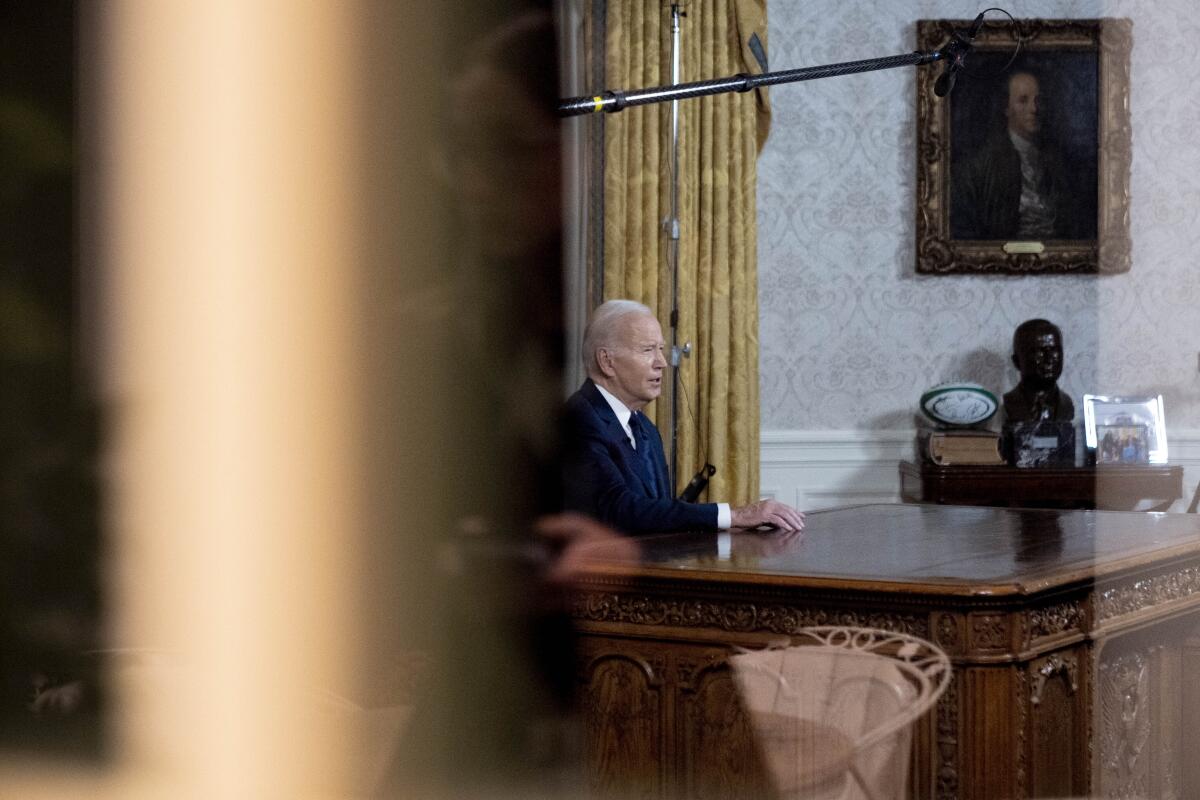Biden urges more U.S. military funding for Ukraine, Israel in Oval Office address

- Share via
WASHINGTON — President Biden used a rare Oval Office address Thursday to urge Americans to support more military funding for Israel in the wake of a deadly Hamas attack and more aid for Ukraine in its protracted war against Russia, warning that both conflicts pose a threat to U.S. national security.
“Our alliances are what keep us safe. And our values are what make us a partner that other nations want to work with,” Biden said in only his second address from behind the Resolute Desk. “We put all of that at risk if we walk away from Ukraine or turn our back on Israel.”
Biden said he planned to send an emergency funding request to Congress that would provide more assistance for U.S. allies. The request, which the White House is expected to unveil Friday, totals more than $100 billion. The proposal also includes money for Taiwan and for security along the U.S. border with Mexico.
Biden said that although these conflicts can feel “far away,” Hamas and Russian President Vladimir Putin pose a threat to democratic stability around the world.
“Hamas and Putin represent different threats,” he said. “But they share this in common: They both want to completely annihilate a neighboring democracy completely.”
Biden traveled this week to Tel Aviv, where he met with Israeli Prime Minister Benjamin Netanyahu to discuss Israel’s military campaign against Hamas and push for more humanitarian assistance for civilians trapped in the crossfire in the Gaza Strip.
Failing to aid Israel and Ukraine would only embolden their foes, Biden warned.
“When terrorists don’t pay a price for their terror, when dictators don’t pay a price for their aggression, they cause more chaos and death, and more destruction,” he said. “They keep going, and the costs and the threats to America and the world keep rising.”
But he faces an uphill battle in Congress, where progressive Democrats have spoken out against sending more weapons to Israel and right-wing Republicans have questioned continued military assistance for Ukraine.
In August, the White House asked for $24 billion in aid for Ukraine as part of a supplemental funding request, but the provision was left out of a short-term spending measure despite an appearance by Ukrainian President Volodymyr Zelensky at the U.S. Capitol.
Before the speech, Biden spoke with Zelensky to underscore “continued strong bipartisan support” for Kyiv, according to a White House readout of the phone call. But U.S. public support for supplying Ukraine with weapons has waned, according to a Reuters/Ipsos poll released Oct. 5. The survey found 41% of respondents agreed Washington should supply weapons to Ukraine, compared with 35% who disagreed. In May, 46% of respondents said the U.S. should send weapons to Ukraine, compared with 29% who were opposed.
The U.S. has so far provided more than $75 billion in military, humanitarian and financial aid to Ukraine, according to the Kiel Institute for the World Economy.
House Republicans’ failure to elect a new speaker to replace ousted Rep. Kevin McCarthy (R-Bakersfield) has also halted Congress, limiting the lower chamber’s ability to act on any request made by the president.
Biden arrived in Tel Aviv on Wednesday, hours after a massive blast at a Gaza Strip hospital killed hundreds of people, prompting Israel and the Hamas-run Health Ministry to blame the opposing side for the devastating attack. The president reiterated in his Oval Office address that he agrees with Israel’s version of events.
Biden had initially planned to travel Amman, Jordan, to meet leaders from Israel, Jordan, Egypt and the Palestinian Authority, which has no ruling position in Gaza but oversees the larger West Bank. The meeting was scrapped before Biden’s plane left Washington.
During his trip to Israel, Biden vowed to help restore the beleaguered country as a “safe place for the Jewish people.”
“And I promise you: We’re going to do everything in our power to make sure that it will be,” he said in a speech after meeting Netanyahu and his war Cabinet.
But Biden warned Israelis not to be “consumed by rage,” using the Sept. 11, 2001, attacks in the U.S. as a cautionary tale, noting that while the United States sought and found justice, it also made mistakes.
More than 1,400 people have been killed in Israel and 3,400 in Gaza since the conflict began Oct. 7 with Hamas’ surprise incursion of the Israeli border.
“Tonight, there are innocent people all over the world who hope because of us, who believe in a better life because of us, who are desperate not to be forgotten by us and are waiting for us,” Biden said.
“But time is of the essence. I know we have our divisions at home. We have to get past them. We can’t let petty, partisan, angry politics get in the way our responsibility as a great nation.”
In Biden’s only other Oval Office speech, in June, he delivered remarks after reaching an agreement with then-Speaker McCarthy to avoid defaulting on the nation’s debt, a deal that was scrapped months later by House Republicans.
More to Read
Get the L.A. Times Politics newsletter
Deeply reported insights into legislation, politics and policy from Sacramento, Washington and beyond. In your inbox three times per week.
You may occasionally receive promotional content from the Los Angeles Times.











